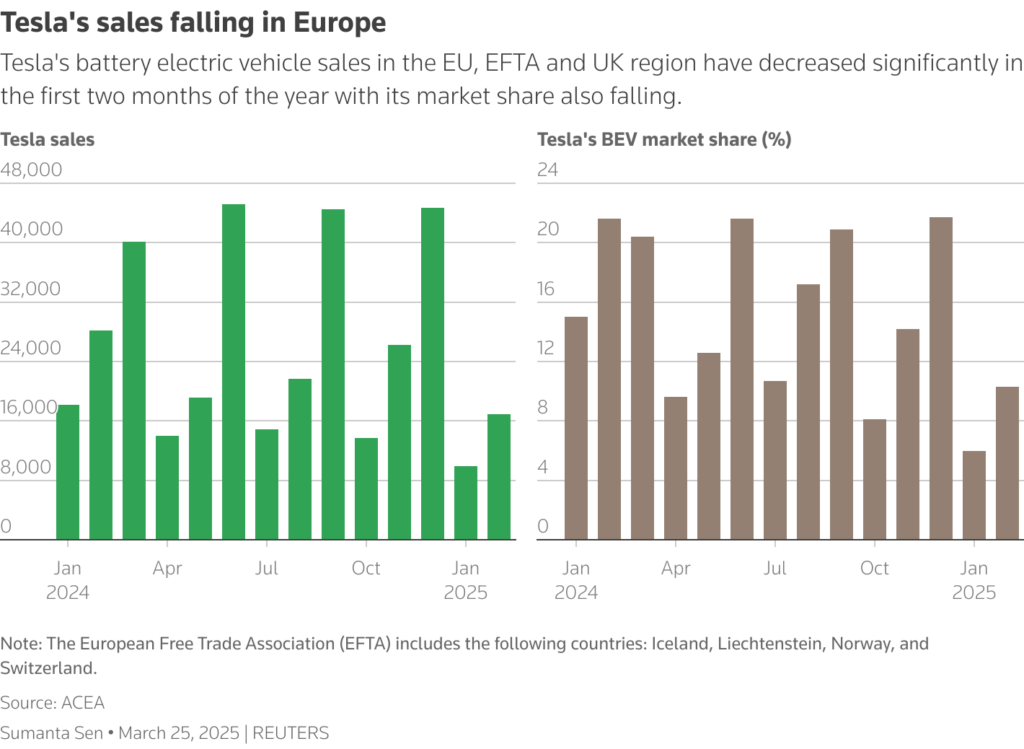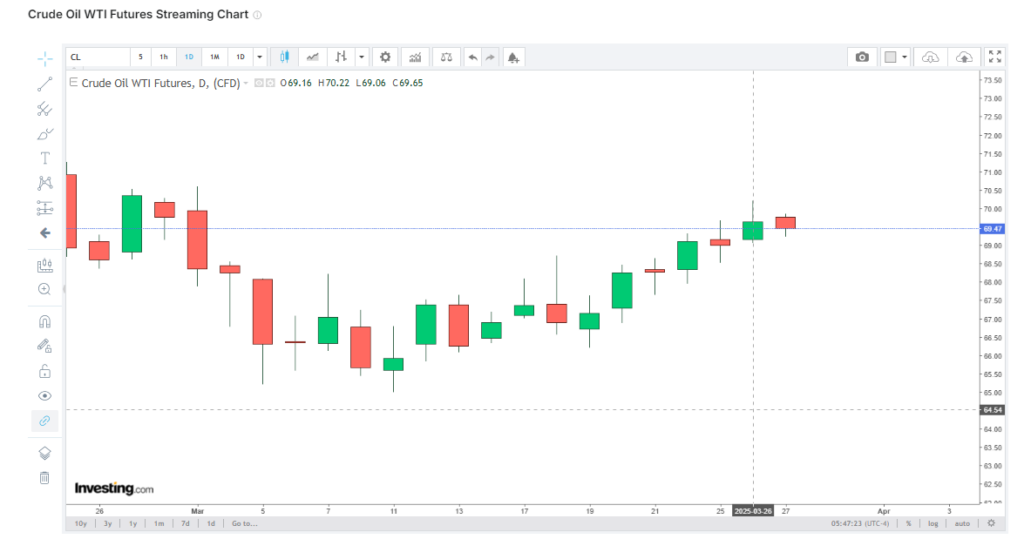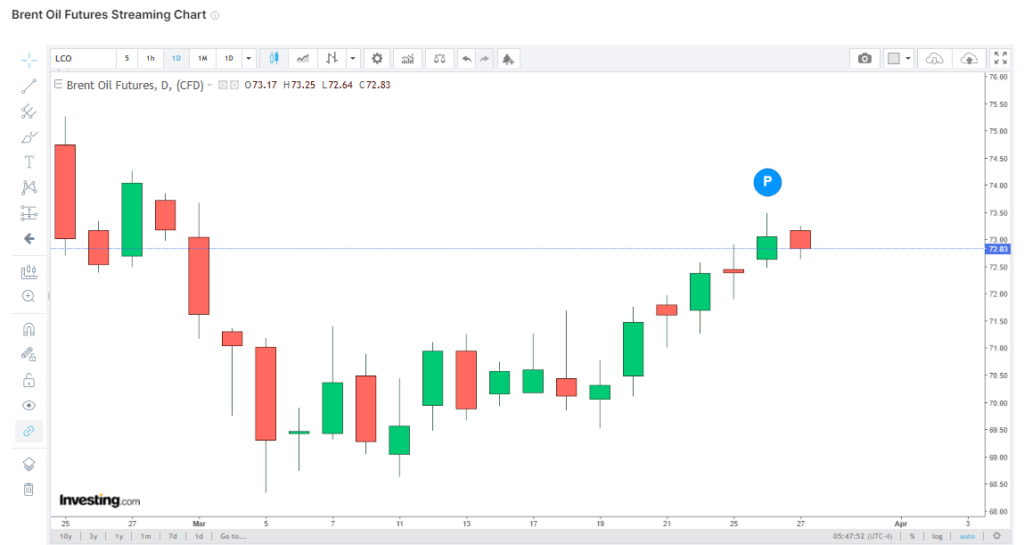March 27, 2025 | CG Fintech
Welcome to this week’s market recap at CG Fintech, where we break down the most critical developments impacting global markets.
From geopolitical tensions to shifting oil dynamics and Tesla’s ongoing challenges in Europe, here’s what traders and investors need to know as we close out the week.
Russia-Ukraine Truce Falters, Raising Market Uncertainty

The week started with a glimmer of hope as the United States brokered separate agreements with Ukraine and Russia to pause attacks on energy infrastructure and in the Black Sea.
Announced on Tuesday, the deals aimed to stabilize a region critical for global energy and food supply chains. However, within hours, the truce unraveled. Ukraine accused Russia of launching 117 drone attacks overnight, including a massive strike on Kryvyi Rih, while Russia claimed Ukraine attempted to hit energy facilities in Crimea and other regions.
The European Union further complicated matters by refusing to lift sanctions on a Russian state bank—a key Kremlin condition for the Black Sea ceasefire-until Russian forces withdraw from Ukraine.
For traders, this breakdown signals heightened geopolitical risk.
The ongoing conflict continues to threaten energy markets, particularly gas and oil infrastructure, which have been frequent targets. With NATO’s Secretary-General Mark Rutte warning that normalization with Russia could take decades, investors should brace for prolonged uncertainty in European markets.
Keep an eye on energy-related assets and safe-haven plays like gold, which remain sensitive to these developments.
Tesla Faces Headwinds in Europe Amid Growing Competition
Tesla, a darling of the EV market, is facing turbulent times in Europe.
Data from the European Automobile Manufacturers Association (ACEA) revealed a significant decline in Tesla’s battery-electric vehicle (BEV) sales, down 42.6% in the EU, EFTA, and UK so far this year.

The company’s BEV market share also dropped to 10.3% in February, a steep fall from 21.6% a year ago. Visual data further illustrates this trend, showing Tesla’s sales in the region plummeting over the past year, alongside a shrinking market share.
Despite the launch of a new Model Y mid-size SUV this month, Tesla is grappling with an ageing lineup, increased competition from traditional automakers, and new Chinese entrants offering cheaper electric models.
Economic slowdowns in Europe and controversial moves by CEO Elon Musk, including his engagement with far-right parties, have added to the company’s woes.
While overall BEV sales in Europe rose 26.1% in February, Tesla’s struggles highlight the challenges of maintaining dominance in a rapidly evolving market.
Investors should monitor whether the new Model Y can reverse this trend, but for now, Tesla’s European outlook remains cautious.
Oil Markets Navigate Trump’s Auto Tariffs and Supply Concerns
Oil markets experienced a mixed week as traders assessed the impact of U.S. President Donald Trump’s latest policy moves.
Brent and WTI crude futures edged lower on Thursday after an earlier uptick, driven by U.S. crude inventory declines and tariff threats on buyers of Venezuelan oil.

Trump’s announcement of a 25% tariff on imported cars and light trucks, set to take effect next week, added another layer of complexity.

While higher auto prices could slow the transition to fuel-efficient models—potentially supporting oil demand—analysts warn that demand concerns from U.S. policy uncertainty and tariff wars may resurface.
On the supply side, sanctions on Iran’s oil clients and India’s Reliance Industries halting Venezuelan oil imports due to U.S. tariffs signal tighter global supply. However, the prospect of an OPEC+ supply hike in May could cap any significant price rallies.
China’s upcoming Purchasing Managers’ Index data will also be a key indicator for oil demand in the coming weeks.
For now, oil markets remain in a delicate balance—traders should watch technical levels and geopolitical developments closely.
What’s Next for Markets?
This week’s events underscore the interconnectedness of geopolitics, policy, and market dynamics.
The failed Russia-Ukraine truce highlights the fragility of energy markets, while Tesla’s European struggles reflect broader challenges in the EV sector. Oil markets, meanwhile, are caught between supply risks and demand uncertainties driven by U.S. tariffs.
As we head into next week, investors should stay vigilant for updates on the Russia-Ukraine conflict, Tesla’s Model Y launch performance, and China’s economic indicators, all of which could shape market sentiment.
